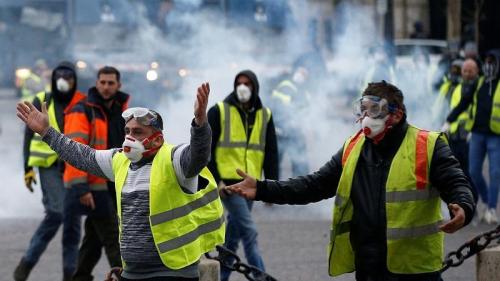How swiftly do genres of the quarantine emerge! Notable among them is the discovery of the relation between the present pandemic and onrushing climate collapse. The driving force of this genre is not holy shit two ways for a lot of people to die but the realization, or hope, that the great mobilizations of state resources currently being unspooled to address COVID-19 prove the possibility of a comparable or greater mobilization against ecological catastrophe, an even greater threat if somewhat less immediate. There is to be sure a certain mixing of analogies: in the United States, confronting climate change is conventionally likened to the New Deal or Marshall Plan, schemes to hedge against the charisma of communism, while addressing the pandemic decisively takes the language of war itself, a “war footing,” “wartime president,” and so on. This is an interesting slippage, no doubt, though both analogies rely on a vision of preserving global hegemony. Insert rueful laugh.
Bruno Latour provides a recent example of this genre; it appeared dually in Le Monde and Critical Inquiry on 25 March, here under the title “Is This a Dress Rehearsal,” and in French under the more prosaic but imperative “Health Crisis Demands We Prepare for Climate Change.”[1] The short piece is filled with the author’s habits of mind such as the inevitable “Latour Litany,” a list of all the various actors human and inhuman in an “entire network,” enumerated with an insistent leveling of its contents where what matters is that all these actors stand in ratio with each other, mute equivalents. It is as if exchange value had taken up a side hustle as a theorist. The goal is to demonstrate yet again the indistinction of nature and society toward discovering the obvious truth that “The pandemic is no more a ‘natural’ phenomenon than the famines of the past or the current climate crisis.”
But here problems arise for the comparison, as the author himself admits. Writing from France, he notes that Emmanuel Macron’s capacity to confront the pandemic is not of a kind with even his least gesture toward (purported) climate abatement, recalling how his gas tax was met not with relief and a thirst for more but with the riots of the Gilets Jaunes movement. Per Latour, this is because Macron — and ostensibly other leaders — have not forged the kind of new state that climate collapse will require. Instead, “we are collectively playing a caricatured form of the figure of biopolitics that seems to have come straight out of a Michel Foucault lecture.”
He means Foucault’s final lecture on the theme Society Must Be Defended, describing a new kind of power. Whereas once “Sovereignty took life and let live,” he writes, we discover toward the end of the eighteenth century “the emergence of a power that . . . in contrast, consists in making live and letting die.” This is the famous formula of biopolitics: the sovereign power to make live and let die.
Latour notes that this power’s deployment in the present moment includes “the obliteration of the very many invisible workers forced to work anyway so that others can continue to hole up in their homes.” Rightly so — this is a peculiarly awful time to be a delivery worker, from the warehouse or restaurant to the driver anxiously tossing a box on your porch. Recent days have presented an even more devastating turn: recent pronouncements by various governmental figures who, noting the economic devastation of COVID-19, proclaimed that people would have to abandon quarantine procedures after a fortnight at the very most and return to work so as to avoid cratering the economy. This despite the medical certainty that this would lead to more transmissions and more deaths. Forty-four years and five days after Foucault’s lecture, Donald Trump tweeted, WE CANNOT LET THE CURE BE WORSE THAN THE PROBLEM ITSELF. AT THE END OF THE 15 DAY PERIOD, WE WILL MAKE A DECISION AS TO WHICH WAY WE WANT TO GO! If this was in any way opaque, two days later Texas Lieutenant Governor Dan Patrick speculated, “are you willing to take a chance on your survival in exchange for keeping the America that America loves for its children and grandchildren? And if that is the exchange, I’m all in.”
But this course of action is not speculative at all: rather it seems to be the express plan of the state, coming soon. Look, to save the economy, we’re gonna have to kill some folks. Like, a lot. Horrified humans immediately noted this was a blood sacrifice to capitalism and who could disagree? This is the most dramatic political development since the early hours of millennium if not very much longer. It must seem like the apotheosis of biopolitics: a crackpot sovereign deciding at national scale who will be made to live, who let die.
Except for the way in which this was, in the clearest manner, the reverse. By 22 March, Goldman Sachs was already predicting an unparalleled 2.5 million new jobless claims; this would prove optimistic.

Meanwhile the Senate tinkered with its relief bill. The massive transfers to corporations were a given, for which 2008 now appears as a dress rehearsal. The haggling endeavored to dial in the exact size of the direct payment to citizens. It would need to restore enough aggregate demand to keep the economy breathing (a ventilator of sorts) while taking care not to give a single prole the incentive to be, in the face of a global and terrifying pandemic poised to kill millions absent assiduous measures taken by all, lazy. And it is to this delicate measure that presidents must also dance, not the measure decided on by the legislature, but the measure of that abstraction “the economy.” Nothing could have thrown Foucault’s formulations about sovereignty and regimes of power, and especially the limits of these ideas, into clearer relief than this week’s pronouncements, provisions, and data.
This is not to say there is no such thing as biopolitics nor any power to make live and let die. Clearly there is; clearly it is this that is wielded by all the Trumps great and small. Nonetheless it is apparent that the sovereign is not sovereign. Rather he is subordinated entirely to the dictates of political economy, that real unity of the political and economic forged by capital and its compulsions. Make live and let die is simply a tool among others in this social order whose true logic, from Trump’s tweet to Dan Patrick to the Senate bill, is the power employed always as a ratio of make work and let buy.
Here we must take a final turn toward where we began and reenter the genre named at the outset. The link between coronavirus and climate is more direct than mere analogy, two threats that challenge our senses of scale and temporality and so seem to demand something like a state to address them. Rather it turns out that one shows us the character of the other with horrific lucidity. We should not be surprised to discover that, like the 2008 economic collapse, the pandemic has significantly reduced emissions globally. The reductions have been particularly marked in China and Italy, the two most devastated nations. We might expect, glancing at the rate of spread and those unemployment numbers, that we will see similar results from the United States. Maybe we will get right with the Paris Accords after all.
This is not to say that we should imagine the virus as a redeemer; that is a particularly grotesque fantasy. Its role in a temporary retreat of planetarily fatal emissions is nonetheless informative. Ecological despoliation is a consequence not of humans, as the name “Anthropocene” and Latour’s essay suggest, but of industrial production and its handmaidens, and only forces which can bring that to heel allow us to prepare for climate change. Capital, with is inescapable drive to reproduce itself, is not some actor in a network, equivalent to other actors, but an actual cause. The compulsion to produce, and to produce at a lower cost than competitors, in turn compels the burning of cheap and dirty fuels to drive the factories, to move the container ships, even to draw forth from the ground the material components of “green energy” sources. The Gilets Jaunes did not riot because they object to ecological policies but because the economy dictates that they find jobs in places they cannot afford to live, and to which they must therefore commute. As long as the compulsions of production for profit and of laboring to live persist, climate survival will be beyond the reach of any state.

We must take this fact with the utmost seriousness: that Foucault’s new regime of power appears in the late eighteenth century, which is to say, alongside the steam engine and the industrial revolution, which is also to say, alongside the liftoff of anthropogenic climate change. We need to stop fucking around with theory and say, without hesitation, that capitalism, with its industrial body and crown of finance, is sovereign; that carbon emissions are the sovereign breathing; that make work and let buy must be annihilated; that there is no survival while the sovereign lives.
29 March 2020
taken from here

